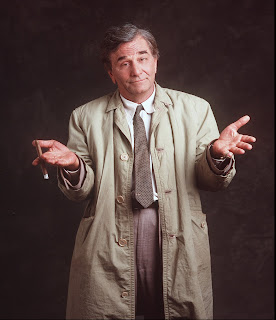Many times it helps to put together a "map" of the story ahead of time. This can take form as an outline, bullet points, or even simple 3x5 cards. The importance is so the author knows ahead of time what's going on and all the relevant information. This way, it's only natural for the "smart" character to be ahead of the audience. Many of the little inferences made by Sherlock Holmes seem rather crazy on retrospection. In the "Sherlock" BBC television show, the first time Sherlock meets Watson, there's a series of deductions made about Watson's phone--deductions that fall apart with a little bit of thought. Despite these things, the scene works perfectly and Sherlock comes off as a brusque, but very astute observer who's intelligence can be trusted. That's a great way to show super intelligent characters.
 |
| Peter Falk as detective Columbo |
Don't let creating super intelligence get in the way of simple storytelling. So long as the author knows what's going on, and gives little hints again and again, the audience will happily go right along with believing in the intelligence of the hero and won't even try finding faults in the logic of events ... at least, not until the story is over and they are trying to figure out how they missed it all.
- M






No comments:
Post a Comment